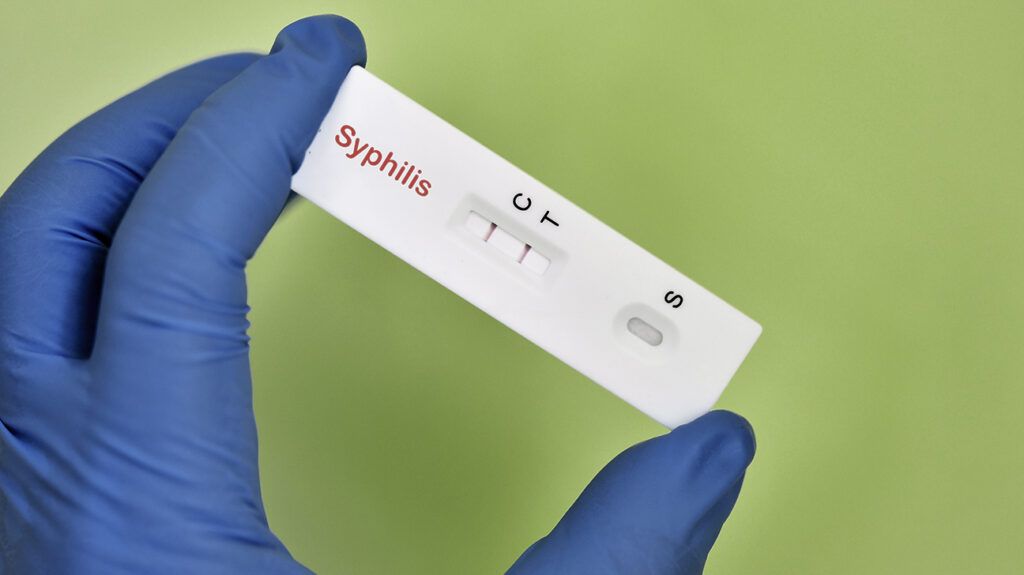Several conditions can cause a false-positive syphilis test result. However, healthcare professionals often use two different tests to diagnose a person with syphilis.
Syphilis is a sexually transmitted infection (STI) carried by bacteria. People with syphilis may have symptoms that come and go as the condition progresses over time. Untreated, they may pass syphilis onto other people despite having no symptoms. Syphilis can also pass from a pregnant person to their baby.
Tests can help tell if a person has syphilis. Syphilis testing usually involves two tests, where the first test screens for syphilis. Since these tests may detect signs of other conditions as well, people may require a second test to confirm and diagnose syphilis.
This article discusses if false-positive syphilis tests are possible. It also discusses what false-positive tests mean, what causes them, and what other infections can be mistaken for syphilis.

Some syphilis tests may produce a false-positive result. False-positive tests for syphilis
Syphilis tests usually involve two steps and two different kinds of tests. Both types of tests have different limitations and costs. This is why healthcare professionals typically
The first testing step is a syphilis screening test. These
These detect syphilis by looking for antibodies linked to having syphilis bacteria in a person’s blood. A person’s immune system makes antibodies if it finds harmful substances in the body.
These tests are often simple and inexpensive.
However, a person’s immune system may make these antibodies
People with a positive nontreponemal test result generally require another type of test. This second test looks for antibodies their immune system only makes to fight off syphilis.
These tests are called treponemal or confirmatory tests, including:
- chemiluminescence immunoassays (CLIA)
- fluorescent treponemal antibody absorption (FTA-ABS)
- microhemagglutination assay for antibodies to Treponema pallidum (MHA-TP)
- T. pallidum enzyme immunoassay (TP-EIA)
- T. pallidum hemagglutination assay (TPHA)
- T. pallidum particle agglutination assay (TP-PA)
If any of these tests show a person has these antibodies, they have a reactive treponemal test. This means they have syphilis currently or have had a previously treated syphilis infection.
Healthcare professionals may sometimes perform treponemal tests first. They do this to identify people with treated, untreated, or incompletely treated syphilis. This is called reverse sequence screening, or a reverse algorithm.
However, this method may lead to
Home syphilis testing kits may only test for syphilis bacteria antibodies. They normally need a treponemal lab test to confirm if a person has syphilis.
Learn about syphilis home testing kits.
False-positive test results
Healthcare professionals and scientists use the terms “reactive,” for tests that indicate antibodies, and “nonreactive,” for those that do not.
If a person has a reactive nontreponemal result and a nonreactive treponemal test result, they likely have a false-positive test. This means it is unlikely they have syphilis.
Several different
These include:
- autoimmune conditions, such as systemic lupus erythematosus (SLE)
- vaccinations
- drug use through injections
- pregnancy
- older age
- some other infections
People
These
- Behçet syndrome
- contact dermatitis
- atopic dermatitis
- erythema multiforme
- genital herpes
- lymphoma
- mononucleosis
- pityriasis rosea
- Rocky Mountain spotted fever
- viral exanthema
Infections that can cause false-positive syphilis tests
- malaria
- HIV
- hepatitis C
- other treponemal infections, or infections from similar bacteria that cause syphilis:
- yaws, which causes long-term skin conditions
- endemic syphilis, a bacterial infection that is not sexually transmitted
- pinta, a skin condition
Some frequently asked questions about syphilis tests are:
How accurate are syphilis tests?
Research from 2019 found that
However, healthcare professionals can use both tests together to confirm if a person has syphilis.
What if syphilis is reactive, but the RPR is negative?
If a person has a reactive treponemal test but a negative screening nontreponemal test, then they most likely have had syphilis in the past. They may also have the early stages of syphilis.
Sexual health resources
Visit our dedicated hub for more research-backed information and in-depth resources on sexual health.
Syphilis is a bacterial STI that people may contract through sexual contact with someone who has it. It can also pass from a pregnant person to their baby.
Syphilis tests can screen for and diagnose syphilis. Healthcare professionals normally use two kinds of syphilis tests.
They may use a nontreponemal test first to detect certain kinds of antibodies. Although this test is simple and inexpensive, other conditions can cause the antibodies the test detects.
If a person has a positive — or reactive — nontreponemal test result, they need another test to confirm they have syphilis — a treponemal test. It specifically detects antibodies a person’s body creates to fight syphilis.
Healthcare professionals may sometimes perform a treponemal test and then a nontreponemal test. This is a reverse algorithm test method.
If a person has reactive nontreponemal and treponemal tests, they have syphilis currently or have had syphilis in the past. If they have a reactive nontreponemal test, but a nonreactive treponemal test, they likely do not have syphilis presently. This is called a false-positive test.
